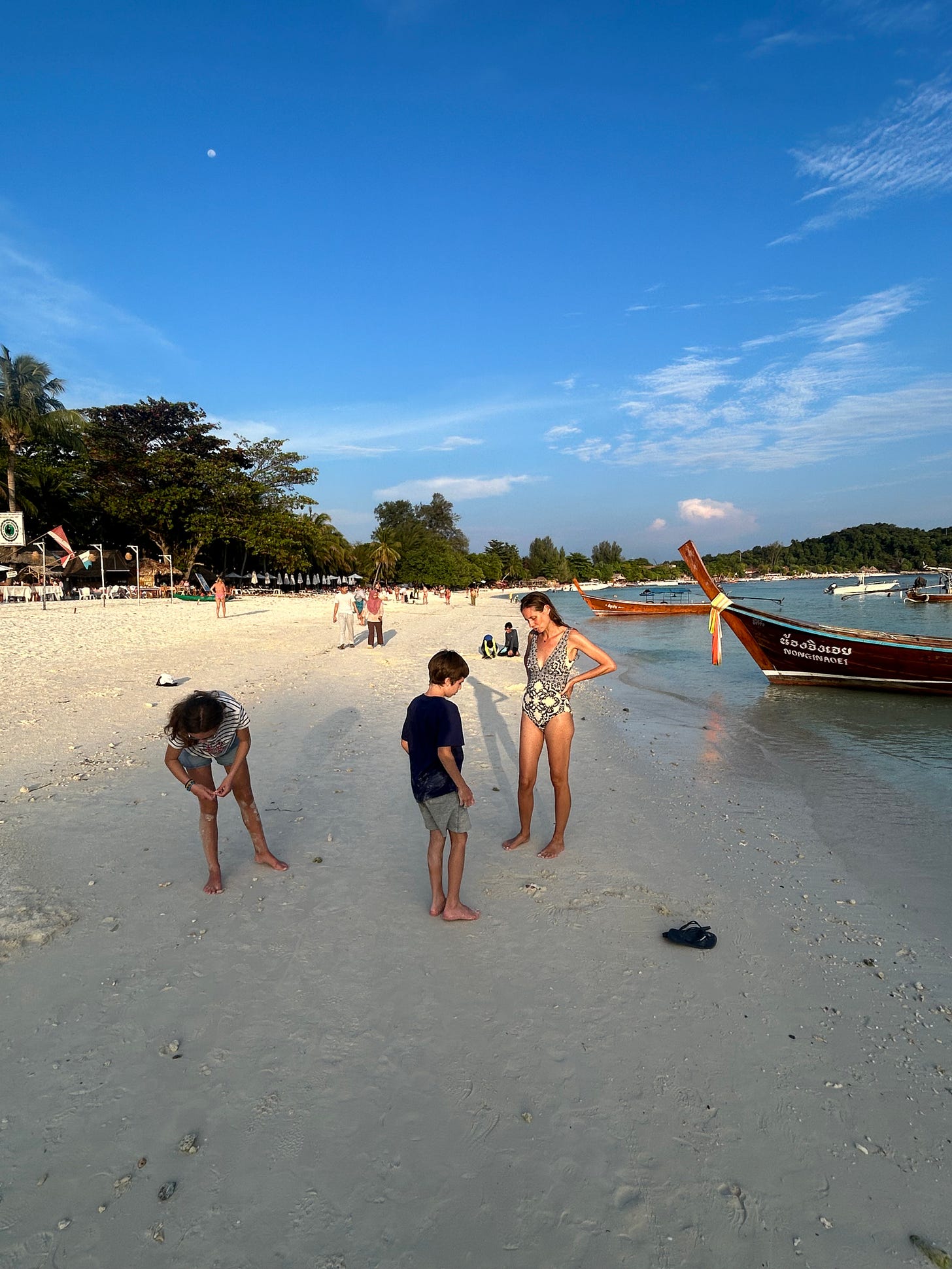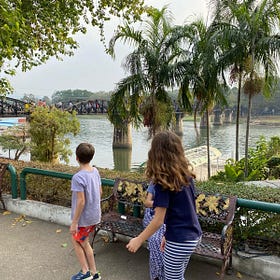When young people tell us things, and we ignore them
(Is this how they become complicit in their own oppression?)
I read a series of posts last week that reminded me of the way children and young people talk about school, and how their opinions are represented in popular culture.
wrote about what young people tell her about school, and points out that the overwhelming narrative from teens is that school is boring, soul-sucking, not what they want to be doing.I remember hearing this over and over again when I was in school. If a class was cancelled or re-scheduled, if a deadline was moved or a test postponed, it was only a good thing. When PE had to be cancelled because of rain, I was relieved (arguably, PE is often some kids’ favourite subject, but that wasn’t me.) If my Economics teacher was absent, we threw a quiet party. I wasn’t one to skip classes but my peers did this, routinely.
I actually enjoyed school as a whole, but it was also equally massively anxiety-inducing and stressful. I was never given the choice to pursue my education in any other way, and had no idea it was even a possibility. And so I described myself as someone who did well in school. But with hindsight, I did what I had to do and it was relatively easy for me to comply because I enjoyed learning no matter what it looked it, I found the work doable, and I could sit still and pay attention (with a high level of masking that was probably very harmful for me in the long-run).
I find it baffling that we are so deeply brainwashed by a society that sees school as the ONLY way to get educated and therefore succeed in life, while also simultaneously accepting that children, especially as they get older, hate or at the very least resent school.
How do we let these two things co-exist in our minds so effortlessly? And think that it’s okay?
In the so-called adult world, it’s a little bit like the way we complain about the grind of a 9-5 job and how soul-sucking it is, while also maintaining that this is simply the way it is and that our offspring should be preparing for the workplace from day 1.
(There’s obviously one big difference in these parallel narrativevs: the job market offers a degree of choice, and we are paid to work; schooling is simply not a choice, and it’s also an awful lot of unpaid work.)
How can we stand the cognitive dissonance?
How can we carry on, as a society, ignoring what our children and young people are telling us?
And if you’re in doubt they are telling us this, it is EVERYWHERE.
Apparently “why do kids hate school” is actually a very commong question on Quora, advice abounds about what to say when your kids say they hate school, and we find reference to the drudgery and awfulness of school in books from Matilda to Captain Underpants to Big Nate to Percy Jackson.
(As a side note, I actually struggled to find shows and books for my children that portrayed learning as a) separate to school and b) actually a normal human thing that is also really joyful. So many books lump school and learning in one box, and essentially label both as mostly undesirable.)
I did some quick research for this post, and found a worrying amount of forums where young people - mostly teens - talk about why they hate school or are struggling with it in some way. One thing that was really sad about this, is that hating school makes a lot of young people feel like there’s something wrong with them - rather than empowering them to recognise there’s something wrong with school, and that everyone is born knowing how to learn, and can do it without school.
Rather unhelpfully, we’ve pathologised school refusal - it is now seen as a disorder, as something our young people lack or need to fix, rather than an indictment of school itself. I loved this conversation between
And about the ways we are depoliticising children’s pain by slapping it with a diagnosis rather than seeing it as a form of resistance.It does occur to me that this collective gaslighting - where we tell children that they don’t hate school, they are just unwell, and that school is what everyone does and they need to be able to do it too - is a pre-cursor to the gaslighting to come: if children grow up complaining about the daily grind of school, but also believing it is the only way to be educated and it’s essentially what they deserve to be doing, then maybe the idea is that they will grow into adults who also accept that the daily grind of work is inevitable, and that it’s almost normal to complain about it and equally normal to do nothing about it.
Perhaps if they grow up believe the problem is inside of themselves, they will also grow up believing that any struggles with employment is also an individual problem that requires individual solutions, rather than a structural issue with the workplace and with our economic and social systems.
The narrative that has successfully turned systemic problems into individual ones, is collective gaslighting - what some have called cultural gaslighting.
In unschooling circles we talk a lot about how school doesn’t prepare you for life, but the truth is that from this perspective, it absolutely does.
These two narrative are mirror images; they link childhood to adulthood and ensure that dissatisfation, harm and a sense of brokenness are normalised and remain unquestioned, both at school and at work.
That, to me, is what actually listening to children and giving them full autonomy to choose their educaiton, would do away with.
There would be no “I hate school but I have to do it” because you wouldn’t have to do something you hate, daily, for free. You would grow up believing that adulthood, too, might be like that: a time of autonomy and choice and not a future of struggle and helplessness.
You may even grow up having a firm sense of the way you are imperfect, but fundamentally whole, and that what needs fixing is not you, but institutions and systems.
Perhaps, the amount of people who are complicit in their own oppression, would diminish. Perhaps part of why some children convince themselves that they have to get through school, and don’t even question whether it’s actually a good idea for them, is that they have been gaslit to believe that they cannot make decisions about their own future, they do not know themselves or what is best for them, and they should in fact follow someone else’s directions. They grow up believing that if they cannot succeed at school, then there is something fundamentally wrong with them.
In other words, they have become complicit in their own opression. In the same way that some women submit to their husbands because they are socialised to believe that men know best; or that some populations believe they do not deserve full sovereignty because they have been infantilised to believe in their own inferiority, children grow up being told that they are immature, not to be trusted, incapable of making good decisions, and so on.
Children and young people are socialised to believe that adults are fundamentally superior, and socialised to live in a society that is deeply adultist and ageist. They may grow up with internalised bias AGAINST THEMSELVES.
This is really clear to me when I see older children treating younger ones as less than. They are both seen as children by the adult world, but the older child or teen has internalised the narrative that as we move closer to adulthood, we hold more power and can wield it over those with less.
I have seen this in my own children, in fact. (And this is why we need to name and talk about adultism and ageism and every other -ism!).
All of this reminds me that when young people tell us things, we need to listen. This doesn’t mean we simply give children free reign to make potentially harmful decisions, but it does mean that we find ways to truly hear what they are saying.
When children say they don’t like something, we need to pay attention.
When they tell us things, we need to trust and believe them.
Believing is the opposite of gaslighting. If our systems and institutions were build to truly listen to young people, and if our trained professionals and parents were raised in a society that took what children said to be their undisputed truth (rather than persuading them it’s not real and they are somehow wrong, or that the issue is inside of them), then perhaps we would see less pathologising and more willingness to actually make change, to actually recognise young people are people too.
One of our family values is “We believe and trust each other.”
We have it up on the wall, and still I sometimes have to go and take a look to remind myself. I was not raised in a society that trusted me. My default is skepticism, not belief, even when it comes to my children.
But I want to raise them to know that when they tell me something, I believe them.
I’d love to hear your thoughts!
Fran x
If you enjoyed this post, please consider becoming a paid subscriber. It helps support my writing, podcasting and other work, AND you get a bunch of perks too!
Some more posts you might be interested in:
School isn't always the solution to homeschool struggle
Hello friends, We are in what is beginning to feel like an extended period of not-quite-rightness, punctuated by fleeting moments, sometimes whole days, of fullness and joy. Enough to keep us going a…
Is homeschooling anti-feminist?
If you enjoy my writing, please consider becoming a paid subscriber. Sharing my work is also a great way to support it. Hello friends, This is going to be a juicy one! Because whether you see yourself i…
On the front lines of our double-standards
I’m going to write a bit about youth resistence and children’s power, and if you find any of my writing and sharing valuable, please consider supporting this newsletter by becoming a paid subscriber.









Whoah... this article. We're in the midst of "school refusal" with my 6yo, and I had a breathtaking moment last week that stopped me in my tracks. I saw my child's "school refusal" as an invitation to heal. His resistance has been inviting me to consider that my younger self who felt she had to "perform" the role of student throughout all my schooling should never have had to do that. He's embodying the knowing that school doesn't feel good, and demanding that I not subject him to that. And I'm listening to him, BELIEVING him. Whew... and to be reminded that this is a form of resistance is the very reminder I needed this week. "Believing is the opposite of gaslighting." I have goosebumps reading this.
I have an adult friend who tells me I'm lucky and rare, in that I genuinely love what I do (tutoring homeschoolers). She says that most people, like herself, go to work because they have to, but get little pleasure out of it. Of course, I know SOME people like that, but if it's the majority, how sad! I have seen nieces and nephews go through traditional school and come out with no idea what they want to do. I try to convince parents to let their kids make more choices but outside the homeschool world, it seems to be a foreign concept. Thanks for bringing this up. We need to keep up the gentle push for people to think about a different approach to learning.